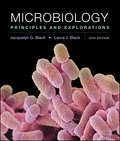
Microbiology: Principles and Explorations
10th Edition
ISBN: 9781119390114
Author: Black
Publisher: WILEY
expand_more
expand_more
format_list_bulleted
Concept explainers
Question
Chapter 12, Problem 1.1SC
Summary Introduction
To describe: The way in which the
Introduction: Parasites are organisms that depend on another organism, called the host for their survival. The disease-causing parasites are called pathogens and the study of parasites is called parasitology.
Expert Solution & Answer
Explanation of Solution
The differences between parasites and predators are listed below:
| Criteria | Parasites | Predators |
| Definition | Parasites are organisms that get nutrients from the host. | Predators are organisms that prey upon other organisms. |
| Types | There are three types of parasites that are found in humans such as protozoa, helminths, and ectoparasites. | The four types of predation include carnivory, herbivory, parasitism, and mutualism. |
| Size | They are mostly smaller than the host organism. | Predators are larger and stronger than the prey. |
| Location | The endoparasites such as protozoa and helminths live inside the host and feed on their nutrients. | They feed over their prey from the outside. |
| Host | They do not kill the hosts. | They kill the hosts and feed on them. |
Want to see more full solutions like this?
Subscribe now to access step-by-step solutions to millions of textbook problems written by subject matter experts!
Students have asked these similar questions
What are parasites?
Why does a parasitic organism not have to be a parasite?
What is the origin of parasites?
Chapter 12 Solutions
Microbiology: Principles and Explorations
Knowledge Booster
Learn more about
Need a deep-dive on the concept behind this application? Look no further. Learn more about this topic, biology and related others by exploring similar questions and additional content below.Similar questions
arrow_back_ios
SEE MORE QUESTIONS
arrow_forward_ios
Recommended textbooks for you
